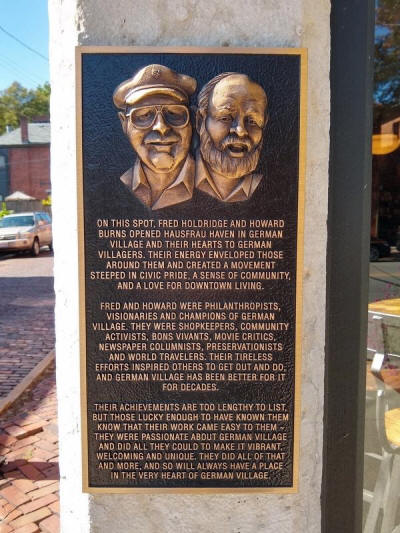 Howard
Louis Burns (October 8, 1920 - 2001) and his partner Frederick J. Holdridge
were hailed as "the popes of German Village" in a 1985
Howard
Louis Burns (October 8, 1920 - 2001) and his partner Frederick J. Holdridge
were hailed as "the popes of German Village" in a 1985 Partner Frederick J. Holdridge
Queer Places:
Hausfrau Haven, 769 S 3rd St, Columbus, OH 43206
 Howard
Louis Burns (October 8, 1920 - 2001) and his partner Frederick J. Holdridge
were hailed as "the popes of German Village" in a 1985
Howard
Louis Burns (October 8, 1920 - 2001) and his partner Frederick J. Holdridge
were hailed as "the popes of German Village" in a 1985
For the 20th-anniversary Pride Parade in 2001, longtime Columbus fixtures Fred Holdridge and Howard Burns were invited to ride as guests of honor. The couple declined. "We've always had the feeling that you don't flaunt it, " Holdridge said. "You're part of the community, and you should be accepted for who you are, not what you are." Nevertheless, Fred and Howard -- so well-known that many people refer to them without using their last names -- were honored in absentia.
The two have been heavily involved in the community as German Village boosters, theater patrons and former owners of the eclectic novelty of a store, Hausfrau Haven. During the June 23 parade, organized each year by the gay community, a sign on an antique car included them among the top 20 gay pioneers in Columbus history. Afterward, so many friends told Fred and Howard they were missed that the pair began to have second thoughts. "We've never marched in a gay parade, " Holdridge said, "but we might as well have done it." They celebrated their 50th anniversary together in 2001 by speaking publicly for the first time, and to The Dispatch, about the challenges they have faced.
"To explain the relationship to people at work, " Holdridge said, "you had to say you were cousins. We couldn't get an apartment together, because we were two guys." They moved to Columbus in 1959. "We came here because Columbus was a nice, quiet town, but we had to put up a front, " he said. "Any hint of being gay would have been disastrous."
Burns, who grew up in Chicago, and Holdridge, who was born in Lima, began their relationship in Chicago. The night in 1951 when they met at a gay bar was marked by a police raid -- typical of that era. "It was blackmail, " Holdridge said. "They wanted Howard's car or they'd arrest us for misconduct, but they settled for a hundred dollars. We were happy to pay." At the time, Burns worked for the New York Central Railroad in an environment where any hint of homosexuality was risky. In Columbus, they decided, self-employment would be safer. Together they bought real estate and became landlords; and they operated Hausfrau Haven, a German Village convenience store that evolved into an arty neighborhood center. "We didn't say, 'This is mine, and this is yours, ' " Holdridge said. "We tied ourselves up by putting everything together into one budget. If we ever felt like splitting up, by the time we got to talking about how to split, we'd say, 'Forget it.' " During their first years in Columbus, they didn't socialize much outside a small group of similarly closeted couples. "We led our own lives and enjoyed each other's company, and nobody bothered us. "We didn't meet that many people at church, because we held back. Eventually we discovered the arts was something you could go to without being looked upon as strange."
From the 1970s through the '90s, Fred and Howard thrived as community activists, newspaper columnists, movie critics (on the radio) and world travelers. They became ardent advocates, above all, of the arts and of German Village renewal. They also sponsored an annual International Mail-In Postcard Art Show and played pivotal behind-the-scenes roles in nurturing professional theater. In 1985, when Contemporary American Theatre Company opened, Hausfrau Haven doubled as the ticket office. "We had a paintbrush in one hand and a script in the other, " Burns said. "We enjoyed the arts and knew they needed our support." Burns served as the first board president, with Holdridge following him. In the mid-'90s, they guided the up-and-coming Red Herring troupe as co-presidents. They continue as CATCO board members and as sponsors of a national photographic competition for cemetery art. Looking back, Fred and Howard hail how much progress gay people have made here -- and how much they have added to the city. "You have to give credit to Columbus," Burns said, "for how people have handled themselves."
Howard battled Parkinson's disease for several years. He died in the late fall of 2001.
My published books: